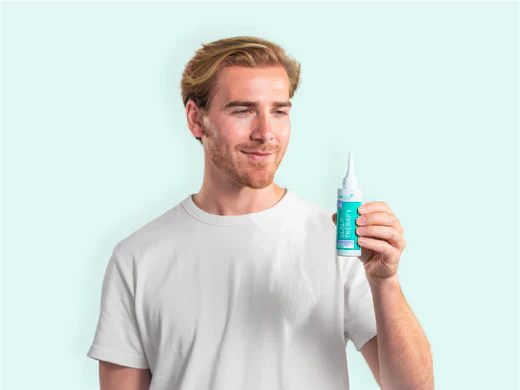A sensitive and painful scalp can occur to everyone. Yet, quite a few people experience it without knowing exactly where it comes from.
In this article you will read everything you need to know about pain on scalp, the causes of scalp pain or a sore scalp, the symptoms of scalp pain and the best way to prevent scalp pain.
What does a sensitive scalp mean?
A sensitive scalp can feel painful, itchy, or like it's burning. This is often caused by stress, skin conditions such as psoriasis, or the use of harsh hair products. The skin becomes more easily irritated. Gentle care and avoiding aggressive products can help relieve symptoms.
Painful and sensitive scalp symptoms
Painful scalp symptoms can take the form of bumps, sores, and pimples. Painful bumps on scalp can come from eczema or acne and often appears as inflamed skin. The infected hair follicles or allergens from shampoos or hair products can cause itching and painful pimples on scalp.
Painful sores on scalp might come in the form of inflammation, tingling, numbness, irritation, itching, and throbbing of the scalp. Many of these symptoms appear together, they link immune processes in response to a variety of conditions.
Causes of scalp pain
Pain on scalp can be linked with various numbers of causes. It is linked with headaches that cause nerve pain on scalp that run from the back of the neck to the forehead. Conditions that cause nerve pain on scalp, a sore scalp, swelling, and restricting of nerves can come from an injury and be experienced as hot, intense shocks.
A painful scalp itself can also be caused by scalp rashes, sunburns, insect bites, head lice, and psoriasis. Many of these conditions can lead to scalp pain, flaking and peeling of the skin, and some can make the scalp bleed.
Dandruff, and tinea capitis can also cause scalp pain when touched. These conditions are not a sign of poor hygiene or an underlying disease, but it can possibly cause itching, inflammation, flaking, and scalp pain. That’s why many people seek a sore scalp treatment to get rid of the irritation of the skin.
Psoriasis of the scalp can also lead to a tender scalp where flaking and crusting of the skin is a normal appearance. A few triggers for psoriasis are stress, hormones, dry air and cold weather. Lichen Planus can also be a possible cause of hair loss because of flaking and scaling.

Sore scalp treatment
As explained above a painful scalp when hair moves appears due to various conditions of the scalp. It is also possible that scalp pain with hair loss appears. This mainly happens when your hair follicle has become damaged. This can cause itching or tingling where hair loss results from, this symptom is called trichodynia and is often the result from telogen effluvium, which is hair loss by stress. The best way to help treat scalp pain combined with hair loss therefore is a sore scalp treatment that also combats hair loss. A treatment for telogen effluvium can provide you with everything you need to combat this type of hair loss and a sore scalp.
When pain of the scalp is caused by dandruff, psoriasis or lichen planus than another treatment might be the best to get rid of the pain you experience on your scalp. We advise you to use special developed products for the scalp and these conditions. If you use the products of this scalp treatment thoroughly the underlying cause of scalp tenderness can be treated effectively.
We believe that it is possible to reduce the pain, inflammation, scales and redness of a sore scalp with an exfoliating shampoo and nourishing mask they combat dandruff, flakes and itching and is also effective against seborrheic dermatitis. The exfoliating shampoo and nourishing mask work on the scalp and removes impurities. It contains a broad spectrum of ingredients with anti-fungal, anti-inflammatory and anti-microbial activity.

Prevention of pain on the scalp
You can prevent pain on the scalp by paying attention to the health of your hair and scalp by washing it carefully. Rubbing or scratching your hair, while washing it can result into a yeast infection and eczema. When you start scratching because of an itchy feeling often the situation gets worse.
Other things that can make your scalp more tense are:
- Spending to much time out in the sun
- Using products with chemicals that can irritate your scalp
- Intense stress can cause hair loss, but can also lead to pain on the scalp
These factors can cause scalp pain. So, It is smart to avoid it as much as possible to prevent experiencing a sore scalp. Of course, you can enjoy the sun. But your hair condition may deteriorate. It is especially important to be careful with your scalp and not to irritate it with chemicals or wrong products.
Conclusion
Pain on the scalp is not a pleasant condition. That is why you can treat it with different treatments depending on the cause of your scalp pain. When you experience scalp pain with hair loss and you want to treat them both you should use the treatment for Telogen Effluvium. But when a scalp condition, such as inflammation or dandruff causes your sore scalp it is best to use a combination of an exfoliating shampoo and nourishing mask.











